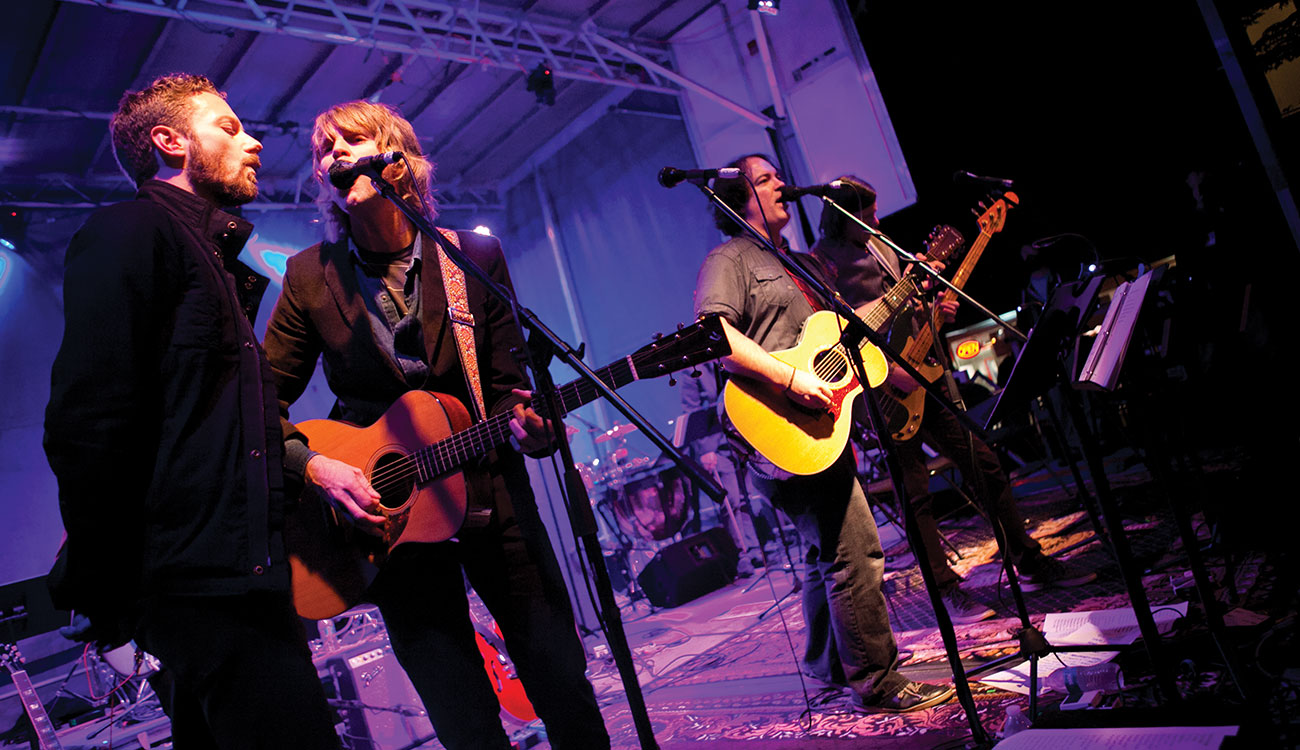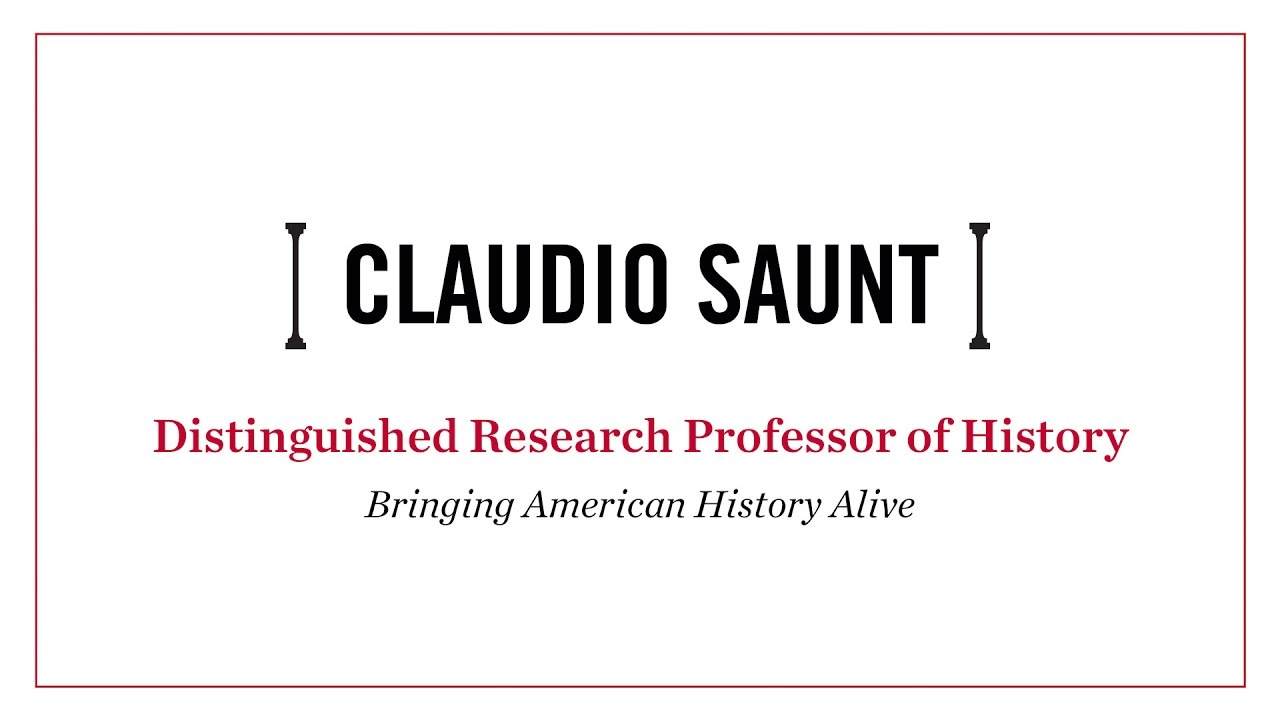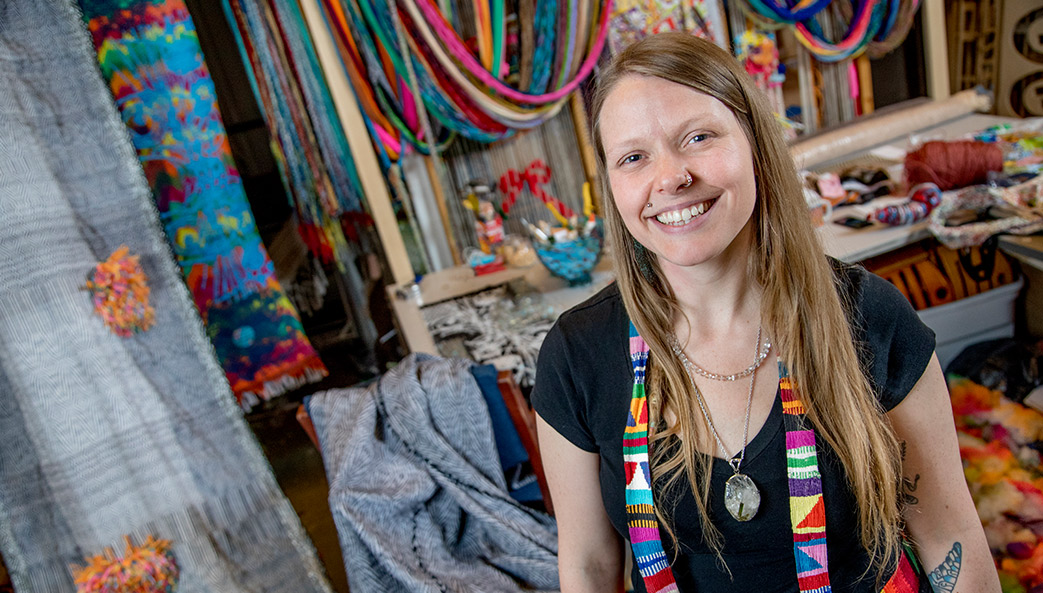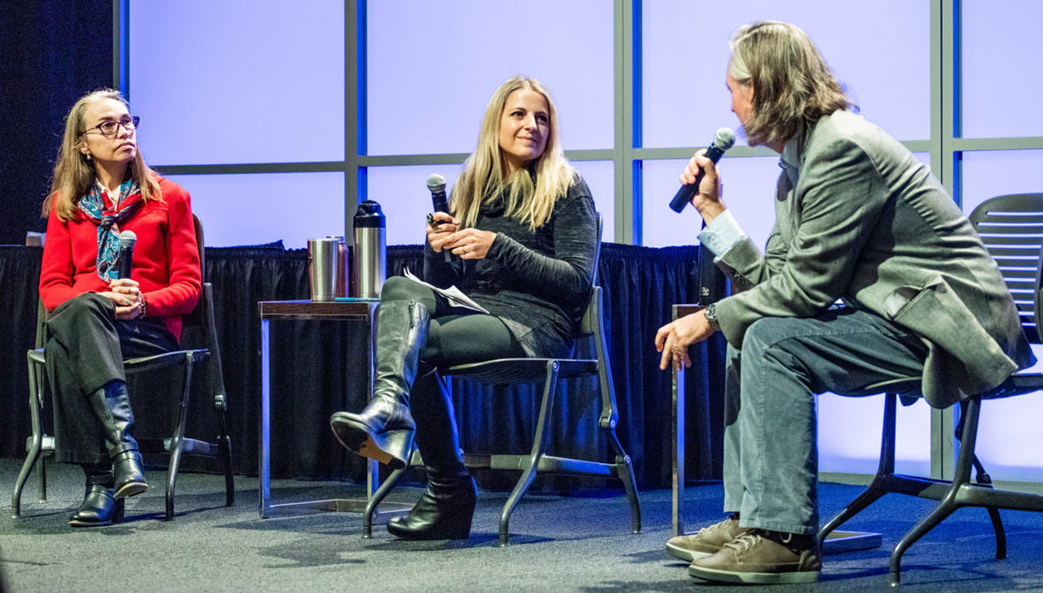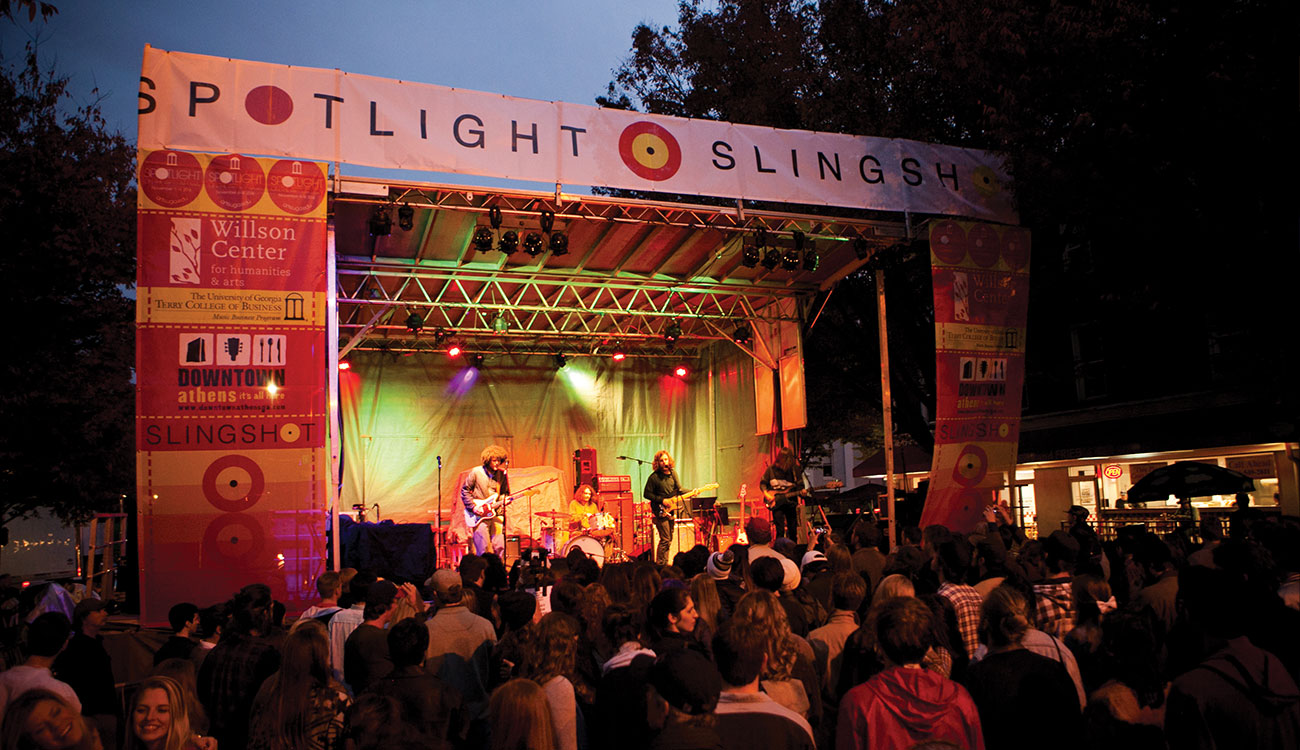
“Ciné is an arts-based nonprofit venture whose services are irreplaceable not only to the Willson Center and the university, but to Athens,” Allen said at the time. “Thinc. at UGA offers us a chance to support and highlight entrepreneurship in all areas, and the arts and nonprofit sectors are crucial ones.”
While Songs @ Ciné was an artistic and entrepreneurial success, it was only a warmup for the Willson Center’s next music event. In 2014, the center had begun supporting the Slingshot festival of art, music and technology, a springtime three-day event in more than 15 venues in downtown Athens and on campus featuring artists and innovators from around the world. For that year’s Spotlight on the Arts, the Willson Center partnered with Slingshot and the UGA Terry College Music Business Program to produce Spotlight • Slingshot, a free Saturday evening concert of five musical acts with close ties to both Athens and UGA.
“We wanted to put on a show that would tell a story about how a university and a community can share resources to produce cultural events that benefit everyone, and I hope we did that,” Allen said. “We like to think that what’s good for Athens is good for UGA, and putting our combined resources behind something that recognizes and enhances Athens’ unique musical life made perfect sense.”
The show was headlined by the 1970s Memphis band Big Star with a performance of their legendary “Third” album. The lineup that evening included original Big Star drummer Jody Stephens, Mike Mills of R.E.M., Chris Stamey of the dB’s, Mitch Easter of Let’s Active, Pat Sansone of Wilco, and Ken Stringfellow and Jon Auer of Big Star and The Posies. Much of the event’s promotion and production work was carried out by students in UGA’s Music Business Program, while students in the Hugh Hodgson School of Music filled out the orchestral section for Big Star’s “Third” performance.
An estimated 3,000 people packed College Avenue for the concert, which was co-sponsored by the Athens Downtown Development Authority.
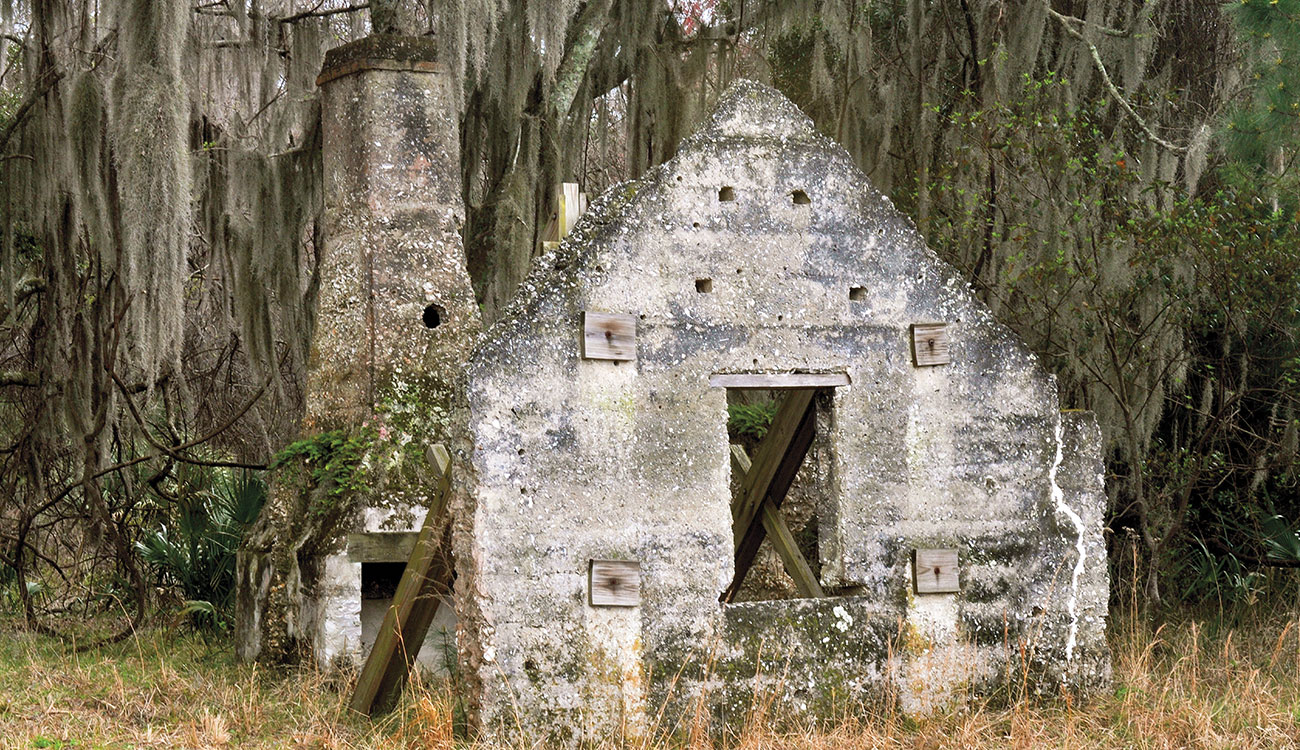
Moving Forward and Farther Outward
The motto of Willson Center’s Global Georgia Initiative, the signature speaker series it hosts each spring, is “Bringing the world to Georgia and Georgia to the world.” That ethos, which could well be applied to the center itself under Allen’s direction, was front and center when Randy Borman came to UGA as a Global Georgia speaker.
Borman, the son of Anglo-American missionaries, was born and raised among the Cofán people of the Amazon. He has been a leader of the tribe’s resistance and reinvention after decades of incursion by oil companies led to a dramatic depletion of resources that posed a grave threat to their centuries-old way of life. He’s now the Cofán’s Chief of Territories.

He spent the afternoon before a well-attended talk at the UGA Chapel, visiting with students at Clarke and Coile middle schools in Athens, teaching them about the environment, responsible use of natural resources and the connections that bind the world’s people across hemispheres, from American cities to Amazonian jungles.
Such innovative approaches to intellectual and cultural conversation go hand in hand with the direct community involvement that so impresses observers like the NHAF about the Willson Center. Representatives of the organization visited UGA in April 2015 for the launch of the Willson Center Digital Humanities Lab and the Digital Humanities undergraduate certificate program, which convinced them that the Willson Center was the right choice to model its humanities communities initiative. They witnessed firsthand the center’s commitment to an inclusive, versatile, hands-on approach to humanities scholarship that also reflects a university-wide prioritization of experiential learning.
The DigiLab, a partnership with the UGA Libraries and the UGA Press, facilitates student participation in digital humanities projects like the Civil Rights Digital Library, CSI Dixie and the Georgia Virtual History Project as part of their academic experience. The GVHP even enlists high school students throughout the state to research, write and publish the histories of their own communities, synthesizing the Willson Center’s dual goals of supporting scholarship on individual levels and promoting the importance of the humanities to audiences beyond the walls of academia.
All of the Willson Center’s outreach to communities from the local to the international is undertaken, at its most basic level, in service of the center’s mandate to support humanities and arts research in the state of Georgia. Its initiatives often attract outside funding, such as the grant awarded to University Librarian and Associate Provost P. Toby Graham by the Andrew W. Mellon Foundation to help establish the DigiLab. And the mission has been joined by the Willson Center Board of Friends, a group of dedicated proponents of the arts and humanities assembled in 2014 to help build private support for the center’s endeavors on behalf of UGA faculty and students.
But Allen, the university’s evangelist for the humanities, remains at the point of the campaign. “The poet William Butler Yeats once asked, ‘How can we know the dancer from the dance?’” he said. “The arts and humanities teach us to see the connections between form and content, event and context, ideas and aesthetics. And they create a space for independent and flexible thought, a capacity our students need now more than ever.”



